Last month, President Donald Trump and President of China Xi Jinping “reached a tentative ceasefire” in the trade war that the two countries have been embroiled in since shortly after Trump took office. Trump is likely to portray this as evidence of his self-declared superlative negotiating skills, which he has touted since the early days of his presidency and before. However, you should not take his word on the pronouncement of his own genius.
Trump is waging a war on trade with China for a number of reasons. He views the U.S.-China trade deficit (the difference in total imports between the two countries – hint: the U.S. imports far more from China than vice versa) as too large, and he wants China to stop stealing intellectual property, usually in the form of technology, from the U.S. His version of fighting the trade war is slapping tariffs, or taxes on imports, on Chinese goods in the hopes that China’s economy will suffer as a result and force Xi to the negotiating table, resulting in an outcome in which China buys more from the U.S. than it does currently. China’s response has been to retaliate with tariffs, hoping for the same economic impact. However, the U.S. economy is hurting more than China’s in the trade war.
Tariffs make imported goods more expensive and the increased cost is passed onto consumers of the products. As a result of this, China’s economy is struggling too, since China “exports more goods to the U.S. than to any other country in the world.” Since U.S. consumers are forced to pay more for the same goods, they will buy less of them, which decreases China’s economic output. Unfortunately for Trump, and the Chinese people, the government of China does not care about this decreased economic output as much as he does.
What Trump doesn’t seem to recognize is that Xi is an authoritative dictator. In early 2018, the Chinese Communist Party, of which Xi is the head, made a number of constitutional changes to cement Xi’s dominance over the country. The most significant amendment was to repeal presidential term limits. This implies that Xi can be president of China for as long as he can retain the support of the Communist Party – and with the vote as one-sided as it was (2,958 in favor to two dissents), Xi could conceivably rule until his death.
Another change which may have profound impacts on China’s future governance is that Xi’s ideology was elevated into the preamble of the Chinese Constitution, placing him alongside such figures as the dictator Mao Zedong and ensuring that his word will outlive Xi himself.
Whatever you think of Trump, he is not an authoritarian dictator, regardless of his professed envy of their power. Trump is constrained by term limits — the 22nd Amendment states that “no person shall be elected to the office of the President more than twice.” Therefore, Trump only has eight years to achieve his legislative agenda. Xi, on the other hand, has an entire lifetime.
All of this means that Trump is significantly more beholden to public opinion than Xi. Trump knows that he needs a strong economy to win reelection, while Xi is so entrenched in Chinese power that he can easily win reelection for years on end. Additionally, Xi has unlimited time to wait out a trade war. While Trump needs to “win” the trade war within four years, Xi can simply wait until the next president is elected and sign a trade deal that works significantly more to his advantage.
The timing of the so-called ceasefire is conspicuous: the U.S. is only a year away from the presidential election, and Trump needs all the support he can get from Midwestern farmers who may be hurting because of the trade war. While Trump will likely opine that the ceasefire is a total win for the U.S., critics will rightly realize that this is just a political ploy to win over disaffected voters in the Midwest.
President Trump is not sitting at an even negotiating table with Xi Jinping. The cards are stacked against him, and he is slowly realizing his mistake of starting the trade war to begin with. Do not believe Trump when he says that his godlike business savvy rescued the U.S. from the brink of economic disaster. He was the one who got us to the edge of the cliff in the first place, and is realizing too late that Xi has the upper hand.
Greg Fournier is a Collegian columnist and can be reached at [email protected].




















David Hunt 1990 • Nov 6, 2019 at 1:55 pm
So, in other words, you’re taking the side of a Communist dictatorship, giving advice to them on how to beat our President.
James Murphy • Nov 6, 2019 at 1:03 am
“What Trump doesn’t seem to recognize is that Xi is an authoritative dictator…”
How did absolute power work out for Emperor of China Pu Yi, Russian tsar Nicholas II, and a host of others?